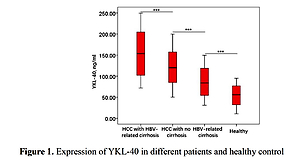Current issue
Archive
Manuscripts accepted
About the Journal
Editorial office
Editorial board
Section Editors
Abstracting and indexing
Subscription
Contact
Ethical standards and procedures
Most read articles
Instructions for authors
Article Processing Charge (APC)
Regulations of paying article processing charge (APC)
HEPATOLOGY / EXPERIMENTAL RESEARCH
Up-regulated YKL-40 is associated with poor prognosis of hepatocellular carcinoma patients with hepatitis B-related cirrhosis
1
Department of Hepatobiliary Surgery, Tongling People’s Hospital, Tongling, China
2
Department of General Surgery, Shanghai Xuhui Center Hospital, Shanghai, China
Submission date: 2021-05-24
Final revision date: 2021-08-16
Acceptance date: 2021-08-31
Online publication date: 2021-09-17
Corresponding author
Zhengdong Zhang
Department of Hepatobiliary Surgery, Tongling People’s Hospital, No.468 Bijiashan Road, Tongling, 244000, China, Phone: 86-0562-5838103, Fax: 86-0562-5838103
Department of Hepatobiliary Surgery, Tongling People’s Hospital, No.468 Bijiashan Road, Tongling, 244000, China, Phone: 86-0562-5838103, Fax: 86-0562-5838103
KEYWORDS
TOPICS
ABSTRACT
Introduction:
Hepatocellular carcinoma (HCC) accounts for more than 90% of primary liver cancer, which is the fifth most common cancer and the leading cause of cancer-related death worldwide. Aim of the study was to investigate the clinical significance of YKL-40 in HCC patients with hepatitis B (HBV)-related cirrhosis.
Material and methods:
The present prospective observational study included 129 cases of HCC patients with HBV-related cirrhosis between January 2017 and April 2019. Also, 152 patients with only hepatitis B-related cirrhosis and 110 HCC patients with no cirrhosis were enrolled during the same period. Additionally, 100 healthy individuals were enrolled as a control group. Serum YKL-40 levels were determined using the enzyme linked immunosorbent assay (ELISA) method. Levels of serum albumin, total bilirubin, alanine aminotransferase (ALT) and aspartate transaminase (AST) as well as HCC-related biomarkers of α-fetoprotein (AFP), des-γ-carboxy prothrombin (DCP), γ-glutamyltransferase (GCT), α-L-fucosidase (AFU), carcinoembryonic antigen (CEA) and carbohydrate antigen 19-9 (CA19-9) were measured using automatic biochemical analyzers. Patients’ demographic and clinical characteristics were collected and analyzed.
Results:
The expression of YKL-40 was the highest in HCC patients with HBV-related cirrhosis and the lowest in the healthy controls, and the difference compared with other groups was significant. HCC patients showed markedly higher YKL-40 levels than the HBV-related cirrhosis patients. Patients with higher expression of YKL-40 showed higher rates of TNM stage IV, lymphatic metastasis and Child-Pugh C, as well as higher serum levels of AFP, AFU and CA19-9 than those in the patients with lower levels of YKL-40. YKL-40 level was positively correlated with AFP and AFU. Survival analysis showed that patients with higher expression of YKL-40 had a shorter 1-year survival time than the patients with lower YKL-40.
Conclusions:
YKL-40 was elevated in HCC patients with HBV-related cirrhosis and high expression of YKL-40 predicted poor prognosis and shorter 1-year survival.
Hepatocellular carcinoma (HCC) accounts for more than 90% of primary liver cancer, which is the fifth most common cancer and the leading cause of cancer-related death worldwide. Aim of the study was to investigate the clinical significance of YKL-40 in HCC patients with hepatitis B (HBV)-related cirrhosis.
Material and methods:
The present prospective observational study included 129 cases of HCC patients with HBV-related cirrhosis between January 2017 and April 2019. Also, 152 patients with only hepatitis B-related cirrhosis and 110 HCC patients with no cirrhosis were enrolled during the same period. Additionally, 100 healthy individuals were enrolled as a control group. Serum YKL-40 levels were determined using the enzyme linked immunosorbent assay (ELISA) method. Levels of serum albumin, total bilirubin, alanine aminotransferase (ALT) and aspartate transaminase (AST) as well as HCC-related biomarkers of α-fetoprotein (AFP), des-γ-carboxy prothrombin (DCP), γ-glutamyltransferase (GCT), α-L-fucosidase (AFU), carcinoembryonic antigen (CEA) and carbohydrate antigen 19-9 (CA19-9) were measured using automatic biochemical analyzers. Patients’ demographic and clinical characteristics were collected and analyzed.
Results:
The expression of YKL-40 was the highest in HCC patients with HBV-related cirrhosis and the lowest in the healthy controls, and the difference compared with other groups was significant. HCC patients showed markedly higher YKL-40 levels than the HBV-related cirrhosis patients. Patients with higher expression of YKL-40 showed higher rates of TNM stage IV, lymphatic metastasis and Child-Pugh C, as well as higher serum levels of AFP, AFU and CA19-9 than those in the patients with lower levels of YKL-40. YKL-40 level was positively correlated with AFP and AFU. Survival analysis showed that patients with higher expression of YKL-40 had a shorter 1-year survival time than the patients with lower YKL-40.
Conclusions:
YKL-40 was elevated in HCC patients with HBV-related cirrhosis and high expression of YKL-40 predicted poor prognosis and shorter 1-year survival.
Share
RELATED ARTICLE
We process personal data collected when visiting the website. The function of obtaining information about users and their behavior is carried out by voluntarily entered information in forms and saving cookies in end devices. Data, including cookies, are used to provide services, improve the user experience and to analyze the traffic in accordance with the Privacy policy. Data are also collected and processed by Google Analytics tool (more).
You can change cookies settings in your browser. Restricted use of cookies in the browser configuration may affect some functionalities of the website.
You can change cookies settings in your browser. Restricted use of cookies in the browser configuration may affect some functionalities of the website.



